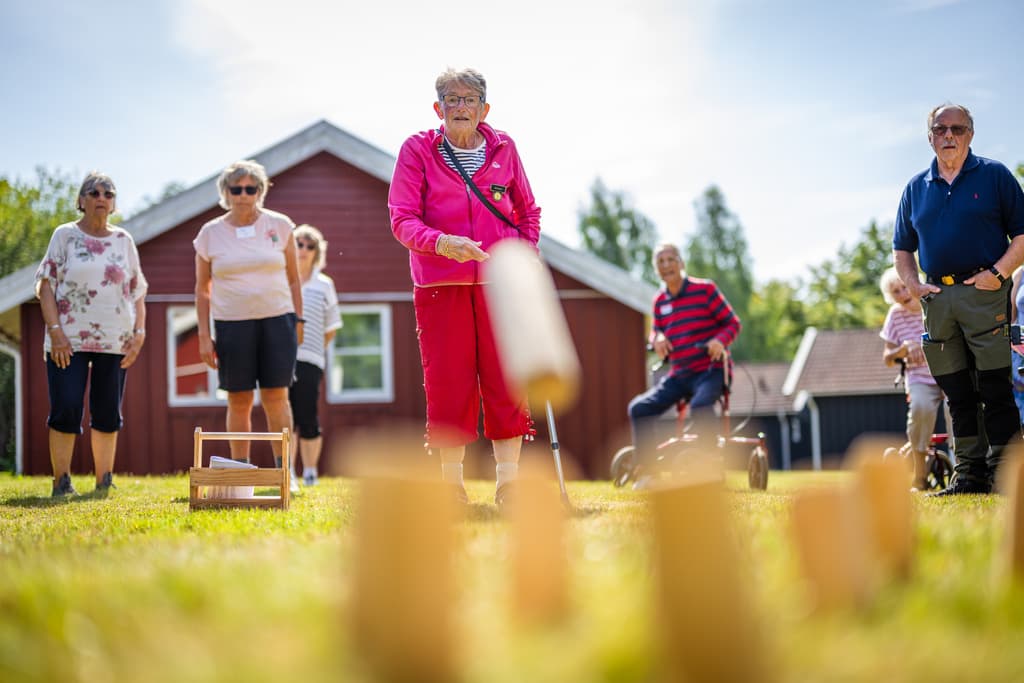Ulla Kairisto is at the senior camp in Norrtälje for the second year in a row. She describes herself as an active person who loves to do things – but that life can still feel lonely sometimes.
I'll be 87 years old in January. That means that most of my friends are dead or have Alzheimer's, she says.
The senior camp takes place during three periods in August with around 15 participants per period and is for seniors from 70 years old. Those who have not participated before are prioritized in the application, but the opportunity to return exists, which Ulla Kairisto appreciates.
It sounded like you only got one chance in life. I wrote in my application how much I liked it last year, and when I got the message that I could come back, it felt fantastic, she says.
"Many are lonely"
This is the third year that the camp is held on Marholmen outside Norrtälje. One of the criteria when applying to the camp is to answer whether you experience loneliness.
The idea is to meet new people. Many are lonely, especially after the pandemic, and the step to get started again and meet people is quite big for many, says Riitta Lukander, chairperson of the Norrtälje Finnish Association.
Monica Röding is visiting the camp for the first time.
It's nice to avoid sitting alone at home and staring at the TV, where it's just reruns anyway, she says.
The Public Health Agency has mapped involuntary loneliness and found that this type of loneliness in Sweden is most common in younger and older age groups. Research shows that loneliness is associated with mental and physical ill-health, suicidal thoughts, and increased mortality.
Mixed activities
The senior camp is arranged as a long-term opportunity to counteract loneliness among the elderly. Here, participants get a chance to try out various activities. But there is also an opportunity to simply enjoy the sun, bathe, and socialize.
They eat breakfast and lunch together and participate in what they think is fun. Among the seniors, this year's tipspromenade seemed to have been very successful.
This is about older people getting something to do together, you live for it. When you get home, you're so pleased, just that you've been able to talk, says Ulla Kairisto.
Ingeborg Nilsson is a professor of occupational therapy and has researched how activities affect well-being, health, and well-being among the elderly. She believes that loneliness is a widespread problem.
You view this as a public health problem that maybe hasn't been focused on enough before. Maybe we have the pandemic to thank a little for starting to talk about it more, she says.
To break loneliness, Ingeborg Nilsson believes that a senior camp is a good start, but it's important that the activities also continue outside the camp.
Traveling abroad
That the camp has led to more long-term relationships is evident in several examples.
After the first year, we had a participant who started a group called Happy Seniors, which is still alive and they meet once a week, says Riitta Lukander.
Another example is two ladies who meet every week now. They also travel abroad together, says Lars Sundberg, chairperson of PRO Norrtälje.
The senior camp is arranged by Healthcare and Social Services in Norrtälje through government grants, together with PRO Norrtälje, Väntjänsten in Norrtälje, and the Norrtälje Finnish Association.
The Public Health Agency has been commissioned by the government to map and increase knowledge about involuntary loneliness. The assignment should be completed by February 1, 2025.
Loneliness can be self-chosen or involuntary, and it is primarily the involuntary loneliness that can negatively affect health.
According to studies, there is a clear link between loneliness and mental and physical ill-health, as well as suicidal thoughts.
Research divides loneliness into three different categories:
* Social loneliness is about lacking a social context. You have no or few relationships.
* Emotional loneliness lacks someone to share thoughts and feelings with. It often lacks close relationships.
* Existential loneliness is often very palpable, where you feel that no one else understands you.
The highest proportion of those affected by loneliness and isolation was found in the age group 16-29 years and 85 years and older, according to the national public health survey from 2022.
About 700,000 people in Sweden lack a close friend, according to figures from the Swedish Statistics Office. According to the statistics, there are more men than women.
Source: Public Health Agency, Swedish Statistics Office.






